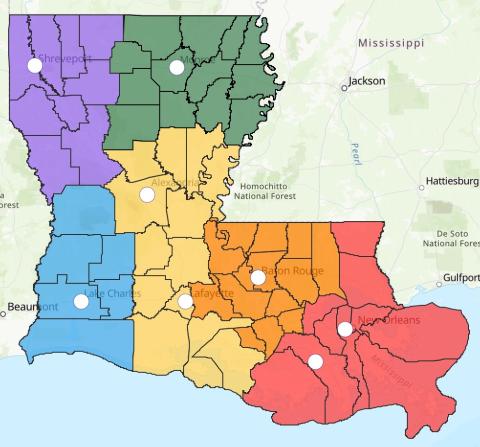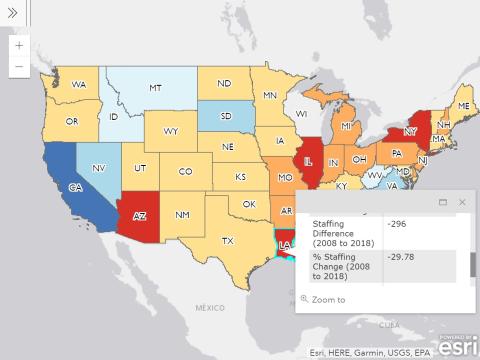Flooding fear Question 4
mtebbeSome residents of flooded homes in Three Rivers/Woodlake blame new housing developments that replaced orchards and a creek bed for recent flooding
Some residents of flooded homes in Three Rivers/Woodlake blame new housing developments that replaced orchards and a creek bed for recent flooding
Farmers drove pickup trucks loaded with dirt into a breached levee, then covered the trucks with dirt
Here is a ProPublic historical outline of DEQ legacy, including officials and their contributions as serving as secretary of the LDEQ https://www.propublica.org/article/how-an-environmental-regulator-became-known-for-protecting-industry
The agency is widely criticized as biased by environmental groups within the Parishes. Conflicts of interest have been cited due to the way in which the department generates funds and can expedite permit approvals. In ProPublica articles, the DEQ has been criticized for non-enforcement against polluting industries and doubting EPAs monitoring. https://www.propublica.org/article/in-cancer-alley-toxic-polluters-face-little-oversight-from-environmental-regulators#:~:text=Series%3A%20Polluter's%20Paradise-,In%20%E2%80%9CCancer%20Alley%2C%E2%80%9D%20Toxic%20Polluters%20Face%20Little%20Oversight%20From,the%20chemical%20industry%20it%20regulates..
Most recently, the EPA is pursuing litigation against LDEQ and Louisiana Department of Health alleging that the LDEQ discriminates on the basis of race, violating Title VI of the Civil Rights Act. Complaints filed on behalf of the Sierra Club, Concerned Citizens of St. Johns, Rise St. James, Louisiana Bucket Brigade and others are in regards to the LDEQ air pollution control programs and permitting that subjects residents on the basis of race, and that the failures to protect the health, disproportionately impact the minority communities, subjecting them to adverse health and environmental impacts.
The LDEQ has been critized for favoring industry, economic and business interests over public welfare. The DEQ has been cited as weighing the creation of jobs and land development over the air and communities being polluted.
Conflicts of interests have been noted through the DEQ expidited permit reviewal process that approves the siting of petrochemical facitilies. If companies want to expidite the permitting process they must pay the DEQ employees overtime. Conflicts of interest have been noted in the structural process of permitting approvals in which the companies pay the regulators that approve them.
The LDEQ consists of five major offices: Office of the Secretary, Office of Management and Finance, Office of Environmental Services, Office of Environmental Compliance, and Office of Environmental Assessment. The Office of Environmental Services is in charge of Air, Waste and water permits. The Office of Environmental Compliance works on surveillance and enforcement. There are multiple regional offices, 8 (shown below in added image), that serve the Parishes. Currently, as of April 2022, Chuck Carr Brown Serves as Secretary.

The LDEQ in recent years is underfunded and understaffed compared to previous years. Budget cuts and employee cutbacks are shown through the Environmental Integrity Project Report: During a Time of Cutbacks at EPA, 30 States Also Slashed Funding for State Environmental Agencies. Images below show Louisiana DEQ cutbacks. Red signifies the most cut backs while blue siginifies increased spending or employment by state.


According to the LDEQ Website, “The mission of the Department of Environmental Quality is to provide service to the people of Louisiana through comprehensive environmental protection in order to promote and protect health, safety and welfare while considering sound policies that are consistent with statutory mandates.”
Strategic plans generated every four years include and highlight FERC motivations, goals, and emphasize key priorities the organization plans on focusing on. The newest FERC Strategic plan FY 2022-2026 demonstrates the organizations shifting focus on environmental implications and environmental justice. Compared to the previous Strategic plans from 2009 till 2022, there have been zero mentions of “environmental justice” or “environmental justice communities”. In the newest 2022-2026 strategic plan there were 24 mentions of “environmental justice” and 11 mentions of “environmental justice communities”. The newest strategic plan focuses on better examining greenhouse gas emissions by revising the analytical framework for evaluating effects of natural gas infrastructure. The newest strategic plan includes an outline to address energy security and reliability given extreme weather events, climate change and new cyber security threats. An additional priority includes improving participation in proceedings, including landowners, environmental justice communities, tribal nations, and members of the public. Their report also includes an emphasis on regulation and compliance with industry.
The structure in which the FERC is funded is one of particular controversy, which was brought to court in 2016 by the Delaware Riverkeeper Network. The DRN alleged that the way in which the FERC was funded was inherently biased in favor of industry and violated the public's 5th amendment right. The FERC has an appropriated budget set by congress. The FERC raises revenue through the industry it regulates to reimburse and generate funding. The lawsuit legally sided with the FERC giving the following reasons: the FERC budget has remained consistently the same, the FERC is statutorily required to eliminate under and over recovery of money, and the opposition failed ot prove it's case.
This organization works with the EPA, US Army Corps of Engineers, US Coast Guard, US Department of Energy, US Fish and Wildlife Services and other agencies on Environmental Impact Statements for new Infrastructure.